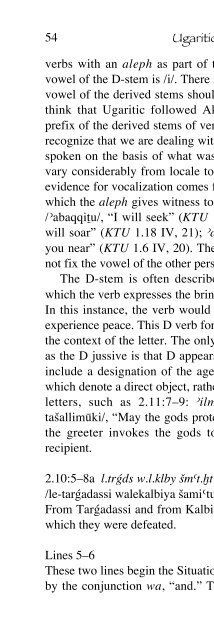A Primer on Ugaritic: Language, Culture, and Literature - enenuru
A Primer on Ugaritic: Language, Culture, and Literature - enenuru
A Primer on Ugaritic: Language, Culture, and Literature - enenuru
You also want an ePaper? Increase the reach of your titles
YUMPU automatically turns print PDFs into web optimized ePapers that Google loves.
54<br />
<strong>Ugaritic</strong> <str<strong>on</strong>g>Primer</str<strong>on</strong>g><br />
verbs with an aleph as part of the root indicates that the theme<br />
vowel of the D-stem is /i/. There is some debate whether the prefix<br />
vowel of the derived stems should be /a/ or /u/. It is reas<strong>on</strong>able to<br />
think that <strong>Ugaritic</strong> followed Akkadian, which uses /u/ for the<br />
prefix of the derived stems of verbs. Of course, the student should<br />
recognize that we are dealing with the tricky questi<strong>on</strong> of what was<br />
spoken <strong>on</strong> the basis of what was written, <strong>and</strong> colloquialisms can<br />
vary c<strong>on</strong>siderably from locale to locale. The <strong>on</strong>ly native <strong>Ugaritic</strong><br />
evidence for vocalizati<strong>on</strong> comes from the 1cs prefixed D forms, in<br />
which the aleph gives witness to the prefix vowel /a/. Thus, }abqt<br />
/}abaqqitu/, “I will seek” (KTU 1.6 IV, 20); }arh˙p /}arah˙h˙ipu/, “I<br />
will soar” (KTU 1.18 IV, 21); }aqrbk /}aqarribuka/, “I will bring<br />
you near” (KTU 1.6 IV, 20). The /a/ vowel in 1cs, however, does<br />
not fix the vowel of the other pers<strong>on</strong>s.<br />
The D-stem is often described as factitive or resultative, in<br />
which the verb expresses the bringing about of a state (see §7.6.2).<br />
In this instance, the verb would express a wish for the pers<strong>on</strong> to<br />
experience peace. This D verb form <strong>and</strong> meaning would seem to fit<br />
the c<strong>on</strong>text of the letter. The <strong>on</strong>ly caveat for interpreting this form<br />
as the D jussive is that D appears to occur with the greetings that<br />
include a designati<strong>on</strong> of the agents involved in the blessing <strong>and</strong><br />
which denote a direct object, rather than an indirect object. In other<br />
letters, such as 2.11:7–9: }ilm tgérk tsûlmk /}iluœma tagégéuruœki<br />
tasûallimuœki/, “May the gods protect you, may they preserve you,”<br />
the greeter invokes the gods to guard <strong>and</strong> bring peace to the<br />
recipient.<br />
2.10:5–8a l.trgéds w.l.klby sûm{t.h˙t}i nh˙t}u.<br />
/le-targéadassi walekalbiya sûami{tu h˙it}eä nah˙ta}uä/<br />
From Targéadassi <strong>and</strong> from Kalbiya I have heard of the defeats by<br />
which they were defeated.<br />
Lines 5–6<br />
These two lines begin the Situati<strong>on</strong> Report. These words are joined<br />
by the c<strong>on</strong>juncti<strong>on</strong> wa, “<strong>and</strong>.” The prepositi<strong>on</strong> /le-/ is separative,


